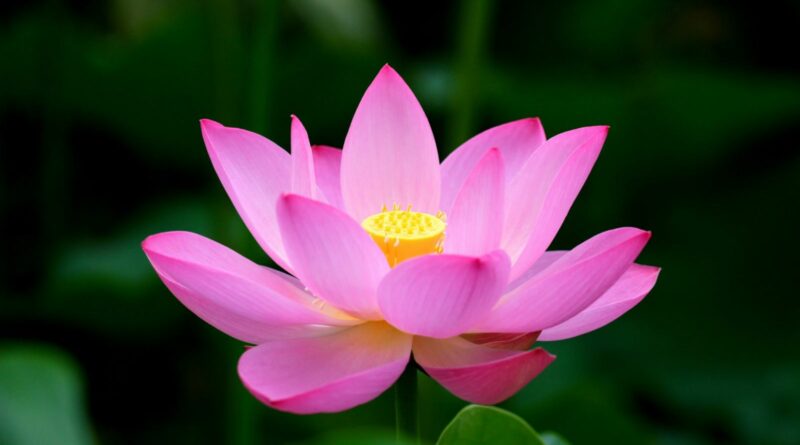Answers By Mr. S. N. Goenka: Dhamma And Sect
Mr. S. N. Goenka: What one’s mind contains, at this moment, is Dhamma. Dhamma is everything there is.
The original Pali term for Buddhism is Dhamma, which, literally, means that which upholds. There is no English equivalent that exactly conveys the meaning of the Pali term.
The Dhamma is that which really is. It is the Doctrine of Reality. It is a means of Deliverance from suffering, and Deliverance itself. Whether the Buddhas arise or not, the Dhamma exists. It lies hidden from the ignorant eyes of men, till a Buddha, an Enlightened One, realizes and compassionately reveals it to the world.
This Dhamma is not something apart from oneself, but is closely associated with oneself. As such the Buddha exhorts:
“Abide with oneself as an island, with oneself as a Refuge. Abide with the Dhamma as an Island, with the Dhamma as a refuge. Seek no external refuge.”
(Courtesy: International Vipassana Newsletter, January 1977)
–Is there any difference between Dharma and Dhamma?
Mr. S. N. Goenka: There is no difference.
–What is the difference between Dharma and duty?
Mr. S. N. Goenka: Whatever is helpful to you and helpful to others is your duty, is Dharma. Whatever is harmful to you and harmful to others is not your duty, because it harms you and also harms others.
–How do you equate religion and Dhamma?
Mr. S. N. Goenka: If religion is taken in a sectarian sense, like Hindu religion or Muslim religion or Buddhist religion and so on, then it is totally against Dhamma. But if religion is taken as the law of nature, the universal law of nature, then it is the same as Dhamma.
–What is the difference in Dharma between Hindus and Muslims?
Mr. S. N. Goenka: Understand: I am not against Hindus or Muslims. I am friendly to everyone, but I am against calling them Dharma. Call them a group of people, call them a sect, but when you call that sect “Dharma,” you are just deluding yourself and others. Dharma is universal. Hindu-dharma is only for a particular society or a particular sect, so it is not Dharma. It is the same with Muslim, Buddhist or Christian. They should all survive, they should have goodwill for each other. If everybody is a Dharma person, then it makes no difference whether one calls oneself a Hindu or a Muslim—they will live in a very cordial way, because they are all Dharmic people. To be a Dharma person is more important than to be a staunch Hindu or a staunch Muslim.
Mr. S. N. Goenka: Vipassana is the only way to help in such a situation. In all these sects, communities, beliefs, dogmas, rites, and rituals, there is something universal: the goal of purifying the mind to such an extent that you will not harm yourself or others. Now one may belong to any community or belief, but everyone can accept this easily.
An example: A large number of Christian priests and nuns come to courses and some have said, “You are teaching Christianity in the name of Buddha.” Everyone wants the mind to become pure. Similarly, whether one is a Jain or a Hindu or anything else, if one starts doing Vipassana, one finds it is universal and good for all. These differences will all be immaterial for people who start working in Vipassana. And this will give a unity to the country, a unity to all humanity. It is a very positive thing to do.
Mr. S. N. Goenka: Yes, it is our duty to keep explaining to people what Dhamma is, and what sectarianism is. It is very unfortunate that when Dhamma comes up in its pure form, very soon it deteriorates into a sect. So the difference between the two should be made clear to help avert this catastrophe throughout the world and especially in a country like India, where there is so much sectarian division and so much strife. But this problem is everywhere in one form or another.
For one who practices Vipassana, it becomes very clear what Dhamma is: Dhamma is the law of nature. Dhamma is always universal, the law of nature is universal. Sectarian things can never be universal. They are different from one another. To those who practise Vipassana, it becomes clearer and clearer, “See, as I defile my mind, nature starts punishing me here and now. It is not that I have to wait for my next life for the punishment. Similarly, as I purify my mind I am rewarded, and I am rewarded here and now. This is the law of nature, this is Dhamma.”
If we perform any pure action—vocal, mental, physical—then certainly we are on the path of Dhamma because we are rewarded and we start helping others. Otherwise we are harmed and we harm others also. This very simple distinction between Dhamma and sect must become clearer and clearer. To those who meditate, it becomes clear that one yardstick by which to measure whether one is really progressing in Vipassana or not is whether attachments towards sectarian beliefs, philosophical beliefs, sectarian rites and rituals, sectarian religious celebrations, etc. are getting dissolved. If the attachment is still very strong one may feel, “I am progressing in Vipassana,” but actually this person is not progressing in Vipassana. If one progresses in Vipassana, then naturally, without any effort, all attachments will go away, because one has started understanding what the real universal Dhamma is. This cannot be forced on people. We can’t expect the whole world to start practicing Vipassana. The real solution comes only when people start experiencing the law of nature; it will become clear only by the practice. On our part we should keep explaining to people what Dhamma is and what sect is and encourage them to practise and see for themselves.
–What is the difference between sectarian beliefs and Dhamma beliefs?
Mr. S. N. Goenka: Beliefs are always sectarian. Dhamma has no belief. In Dhamma you experience, and then you believe. There is no blind belief in Dhamma. You must experience and then only believe whatever you have experienced.
–Sectarianism seems to be another form of casteism. How should we safeguard against these evils?
Mr. S. N. Goenka: To me, sectarianism is worse than casteism. Discrimination on the basis of caste is a poison, but is limited only to India; sectarianism has now become universal. Everywhere people are obsessed with their own sect and feel, “My sect is the best!” For them their sect has become Dhamma.
The Dhamma is the law of nature. It is universal, it can’t belong to a particular sect. If one generates negativity in the mind one is bound to become miserable; one may call oneself Hindu, Buddhist, Christian, or Muslim, but this fact does not alter because it is the law of nature. Likewise, if one eradicates the impurities of lobha, dosa, moha[craving, aversion, ignorance] from the mind, one is bound to feel liberated and peaceful.
One may consider oneself religious yet not have even a trace of Dhamma, in which case the label has no meaning. But if anyone from any religion is full of Dhamma and is a good person, then this person will help to create a healthy society. So long as sectarianism keeps raising its head there cannot be peace in the world. Equally, so long as casteism keeps raising its head in this country, there cannot be peace in this country.
The Buddha condemned casteism and said one is not a brāhmaṇa [of the highest caste] just because one is born to brāhmana parents: One becomes a brāhmana only by purifying the mind. One who is called a śūdra [low-caste] because of being born in a śūdra family can become a brāhmana by purifying the mind.
Therefore we have to keep giving importance to Dhamma, and keep explaining that both sectarianism and casteism are the enemies of Dhamma. No matter what caste or religion one belongs to, if one does not care to live the life of sīla, samādhi and paññā, one has wasted one’s life, harmed oneself, and harmed others.
If you get established in sīla, samādhi, and paññā, no matter what religion you belong to, you are a good, liberated, and pious person, and good people make a good society.
This must be emphasized not merely in discussions or discourses, but in actual practice. Anyone who begins to practise Vipassana will see how useless it is to pride oneself on one’s religion if one does not practise sīla, samādhi, and paññā; and if one is practising these one may belong to any religion.
Source: https://www.vridhamma.org






